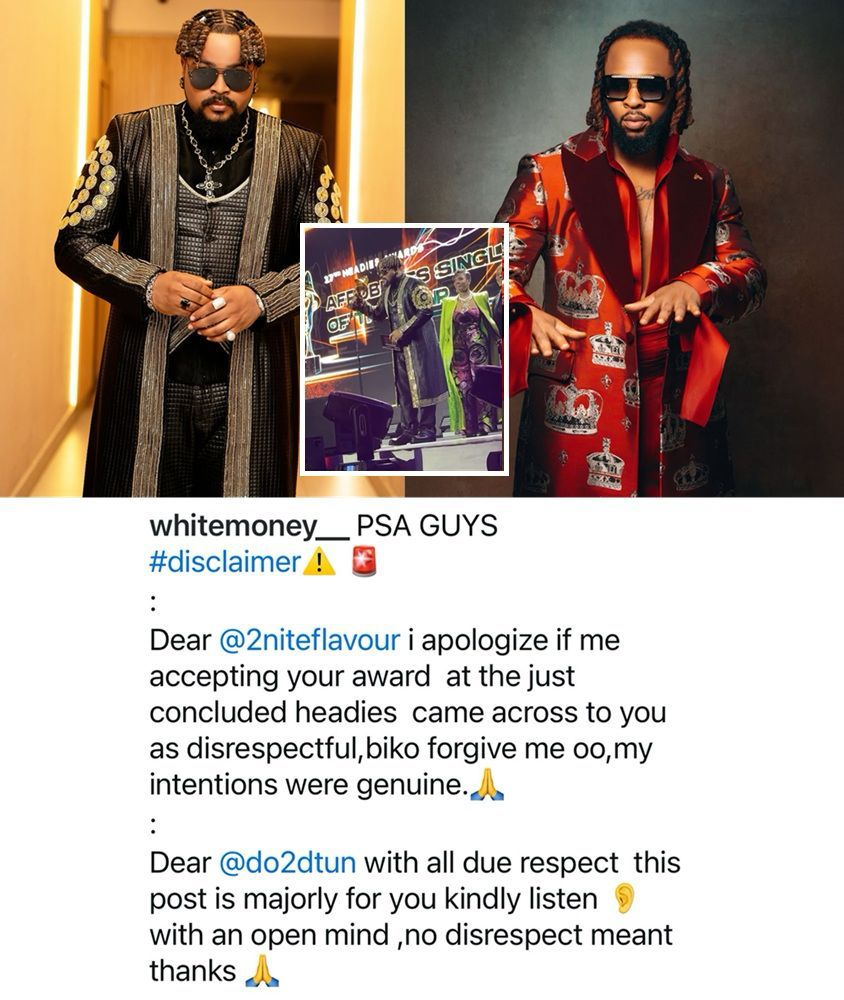
"I Meant No Harm" – Whitemoney Breaks Silence, Apologizes to Flavour Amidst Tribalism Accusations Over Headies Award Controversy

Reality TV star and singer Hazel Oyeze Onou, popularly known as Whitemoney, has finally addressed the controversy surrounding his acceptance of an award meant for fellow artiste Flavour at the recently concluded Headies Awards. The incident, which sparked a wave of backlash and accusations of tribal insensitivity on social media, has pushed Whitemoney into a storm of public opinion—one he is now trying to calm with a heartfelt public apology and a call for understanding.
Whitemoney took to his social media to set the record straight, delivering a passionate and emotional plea to not just Flavour but also to fans and critics who interpreted his actions as a deliberate attempt to disrespect cultural boundaries or fuel tribal sentiments. In a post that has now gone viral, the former Big Brother Naija winner made it clear that his actions were not born out of malice or disregard but out of what he believed to be good intentions on the grand stage.
“I wasn't trying to segregate or marginalize a tribe,” Whitemoney said pointedly, directly addressing the tribalism accusations that have surrounded the incident. “Dear @2niteflavour, I apologize if me accepting your award at the just concluded Headies came across to you as disrespectful, biko forgive me oo, my intentions were genuine.”
The controversy began when Whitemoney walked up to the stage to accept the Headies Award for Best Alternative Song on behalf of Flavour, who was absent from the event. While such a gesture is often seen as a show of solidarity among artistes, many online critics perceived it differently. Social media soon erupted with commentary accusing Whitemoney of overstepping boundaries and seeking undue attention, with some dragging tribal interpretations into the mix, alleging that his action was insensitive to the cultural dynamics at play.
The tension was exacerbated when radio personality Do2dtun commented on the matter, questioning Whitemoney’s motive and calling the act “clout-chasing.” Whitemoney’s apology post included a direct message to Do2dtun, asking him to view the situation with empathy rather than criticism. “Dear @do2dtun, with all due respect, this post is majorly for you. Kindly listen with an open mind, no disrespect meant, thanks,” he wrote, appealing for a more thoughtful dialogue instead of judgment.
It’s not the first time Whitemoney has found himself at the center of social media scrutiny. Since winning Big Brother Naija, his rise to fame has been dotted with both celebratory highs and controversial lows. However, this incident marks one of the more sensitive situations he has had to publicly confront, especially as it touches on the delicate issue of tribalism in Nigeria—a subject that often ignites deep-rooted emotions.
Many fans of Flavour, born Chinedu Okoli, were particularly vocal, insisting that the award acceptance should have been left for Flavour himself or an official representative from his team. Some argued that Whitemoney’s actions appeared opportunistic, especially since there was no indication that Flavour had endorsed him to receive the award on his behalf. Others, however, defended Whitemoney, describing the backlash as unfair and pointing out that it is not uncommon in award ceremonies for one artiste to receive an award on behalf of another.
Still, the incident has sparked broader conversations about celebrity conduct, cultural respect, and how public figures should navigate representation at high-profile events. For Whitemoney, the backlash appears to have been a wake-up call—one that he now seems eager to learn from.
“I’ve always stood for unity and love among all tribes in Nigeria,” he added in a follow-up Instagram story, reaffirming his stance against division and tribal prejudice. “To be accused of something so serious is heartbreaking. I’m a proud Igbo man, but I’ll never do anything to bring dishonor to my people or any other tribe.”
As the dust begins to settle, fans and celebrities alike are beginning to weigh in with their own takes. Some of Whitemoney’s supporters have applauded him for owning up and addressing the matter swiftly, calling his apology both mature and necessary in today’s climate of accountability. “It takes humility to say ‘I’m sorry’ publicly,” one commenter wrote. “Whether he was right or wrong, he chose peace.”
Others believe that the Headies organizers also have a role to play in ensuring better communication around award acceptances in the future to avoid such misunderstandings. Questions have been raised about the lack of clarity regarding who is authorized to receive awards on behalf of absent artistes, and whether the event protocols were adequately followed.
Flavour himself has yet to respond publicly to Whitemoney’s apology, and fans are keenly watching to see whether he will acknowledge or accept the gesture. Known for his calm demeanor and professionalism, many are hopeful that Flavour will rise above the controversy and take the high road.
As for Whitemoney, the incident may serve as a valuable lesson in the responsibilities that come with fame. His journey from the Big Brother house to the Headies stage has been anything but predictable, and this latest chapter is a reminder of how quickly public perception can shift in today’s hyper-connected world.
Still, by speaking out, apologizing, and choosing humility over defensiveness, Whitemoney may have taken a critical step toward mending fences and preserving the public goodwill he has worked hard to build. Whether or not his apology is accepted, it has sparked an important conversation about respect, representation, and the unspoken rules of Nigeria’s vibrant entertainment scene.
Only time will tell if this moment will fade into the background or leave a lasting mark on Whitemoney’s career. For now, the singer seems determined to move forward with clarity, peace, and a deeper sense of responsibility to his craft, his fans, and the cultural values that continue to shape his journey.


